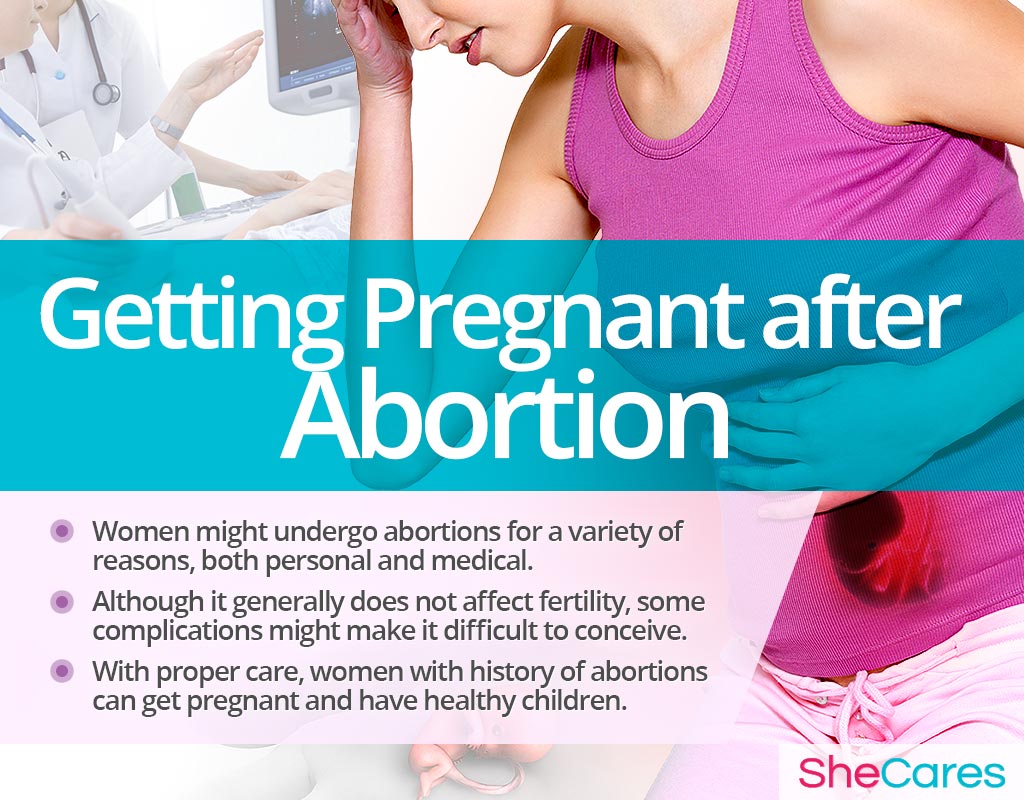Brief Overview of Abortion
Abortion is a termination of pregnancy before the due date. It can be performed in two ways:
With surgery, such as dilation and curettage (D&C) and aspiration. Depending on local laws, a surgical abortion might be permitted by law until between 22 and 26 weeks of gestation.
With medications, which is also called a medical abortion. This type of abortion is performed until the ninth week of gestation.
In medical terms, a non-induced pregnancy loss, such as a stillbirth or miscarriage, is also called a spontaneous abortion.
Women might undergo abortions for a number of reasons, which include attempts to delay pregnancy for later. Different cases involve times when pregnancy threatens the life of the mother or the fetus shows signs of serious defects, among others.
Effects of Abortion on Getting Pregnant
Effects on Fertility
A safely and successfully performed abortion has not been found to affect a woman's reproductive ability. It is possible to get pregnant shortly after the procedure during the next ovulation, even if there continues to be vaginal bleeding.
Sometimes, however, there are certain complications during the procedure that might compromise a woman's fertility. Although rare, they include:
Infections, some of which result in fallopian tube blockage and trigger infertility
Scarring or damage to the reproductive organs during an abortion procedure
Weak or incompetent cervix from multiple abortions, which may increase the risk of miscarriages or preterm births in the future
Effects on the Mother
Although it is normal to experience some mild side effects immediately after the procedure, prolonged or severe symptoms, such as abdominal pain, nausea, or vaginal bleeding, might indicate serious complications.
Some women also struggle with various emotional issues, like guilt, depression, and more.
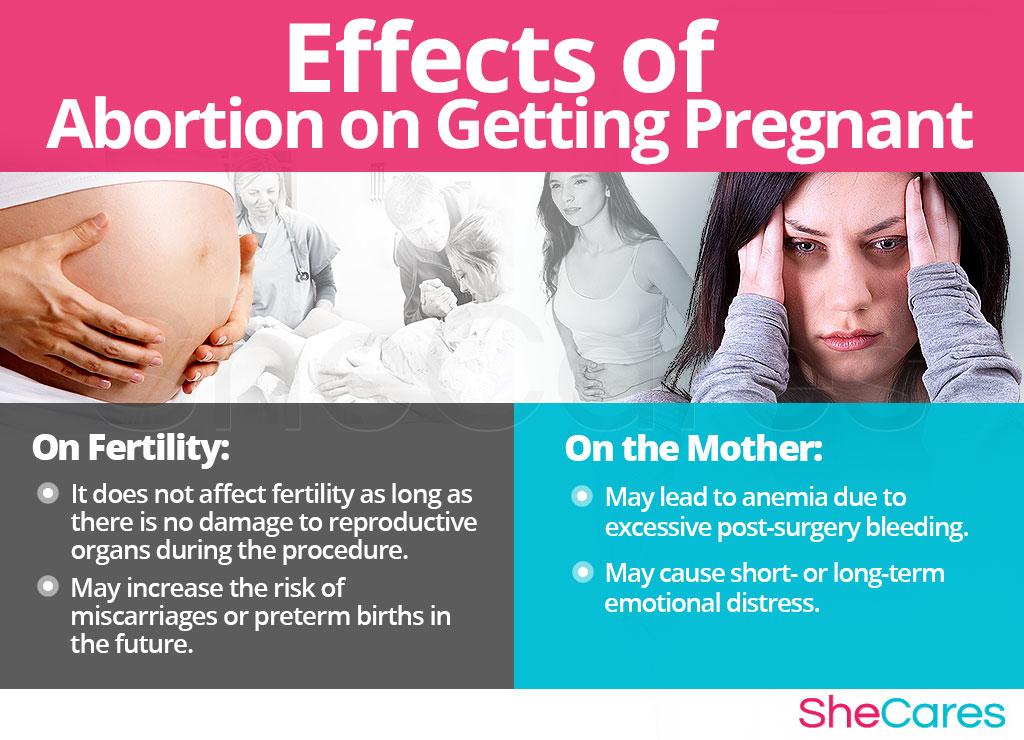
Action Plan
Doctors advise women to plan their next pregnancy ahead of time after undergoing an abortion. The length of time a woman should wait before she gets pregnant again depends on a variety of factors, such as the stage of pregnancy as well as the type and the outcome of the procedure.
Delaying your subsequent pregnancy is also recommended if the abortion was performed due to medical reasons that should be taken care of before conceiving.
Generally, it is recommended to wait at least three months after a non-complicated surgical abortion, and at least 6 months if abortion had some complications or the pregnancy was more advanced. In the case of medication-based abortion, women can typically get pregnant after two weeks.
Months Prior to Conceiving after Abortion
Your goal is to give yourself time for your reproductive organs to heal while strengthening your body with healthy habits in preparation for pregnancy.
Healthy Diet
Eating healthy as you prepare for motherhood can resolve potential nutritional deficiencies and help you reach and maintain a healthy weight, both of which will directly boost your fertility. Choose a colorful variety of foods from different groups, such as:
Phytoestrogenic foods: flax seeds, barley, or carrots
Full-fat dairy: yogurt, cheeses, or whole milk
Fruits and vegetables: leafy greens, yams, or berries
Whole grains, seeds, and nuts: quinoa, chia seeds, and walnuts
Healthy fats: olive oil, avocado, or coconut oil
Lean protein: fish, beans, or chicken
Exercise
Regular physical activity has been found to have beneficial effects on fertility. It can also help you prepare your body for the demands of pregnancy.
Opt for low-impact, muscle-strengthening exercises, such as yoga or Pilates.
Kegel exercises can tighten your pelvic floor muscles, which are necessary to support the growing uterus.
Supplements
Ideally, women should start their prenatal supplementation three to six months prior to getting pregnant. Your doctor might recommend the following supplements:
Prenatal vitamins, which include folic acid, iron, and calcium among others, will only improve your chances of conceiving, but will also help prevent neural tubal defects.
Hormone-regulating supplements, like Macafem, are essential in balancing reproductive hormones, thus regulating menstrual cycles and boosting fertility.
Infection Prevention
If you underwent abortion just recently, it is important to finish the antibiotic treatment as prescribed in order to prevent infections that might affect your reproductive organs, thus diminishing your fertility.
Contraception
Immediately following an abortion, sex is not recommended for at least 2 weeks unless otherwise stated by your doctor. As your body recuperates, it is important to practice safe sex or abstinence in order to prevent an accidental pregnancy.
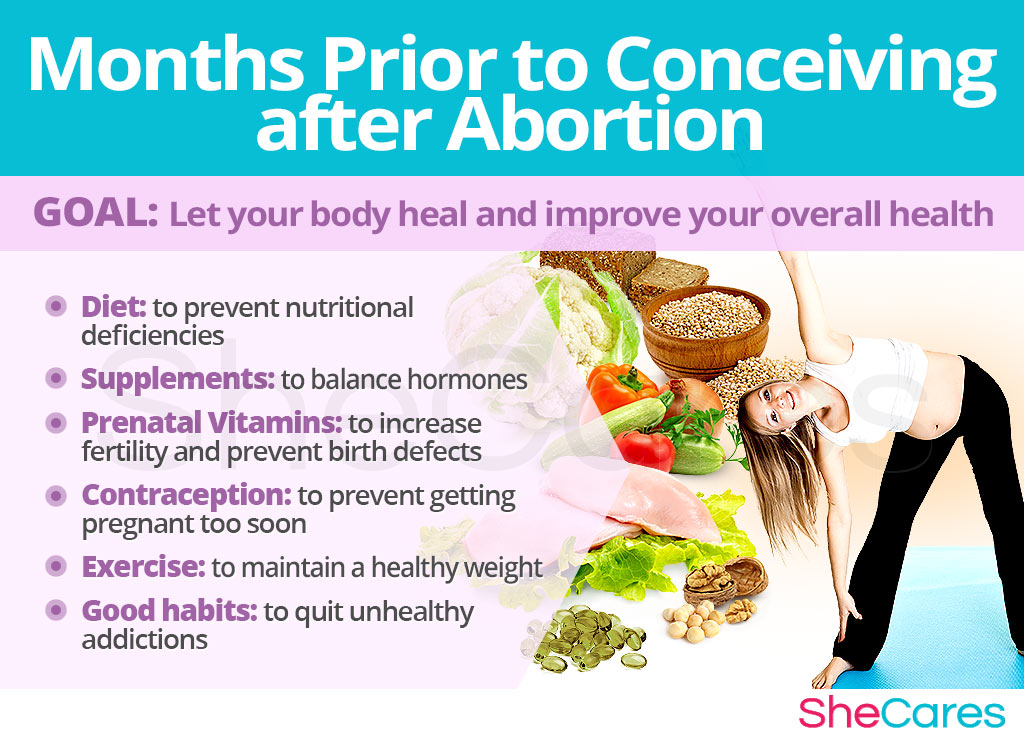
Tips for Conceiving after Abortion
When your doctor gives you the green light, you may begin your efforts to get pregnant. For some couples, it takes one menstrual cycle while for others, it is a more time-consuming endeavor.
Load up on plant-based protein, such as beans, as well as eggs and full-fat dairy to boost ovulation and encourage conception.
Drink plenty of water to make your cervical mucus less thick and more fertile.
Find your favorite ways to prevent stress accumulation.
Have sex daily, preferably four to five days before and on the day of your ovulation to increase your chances of getting pregnant.
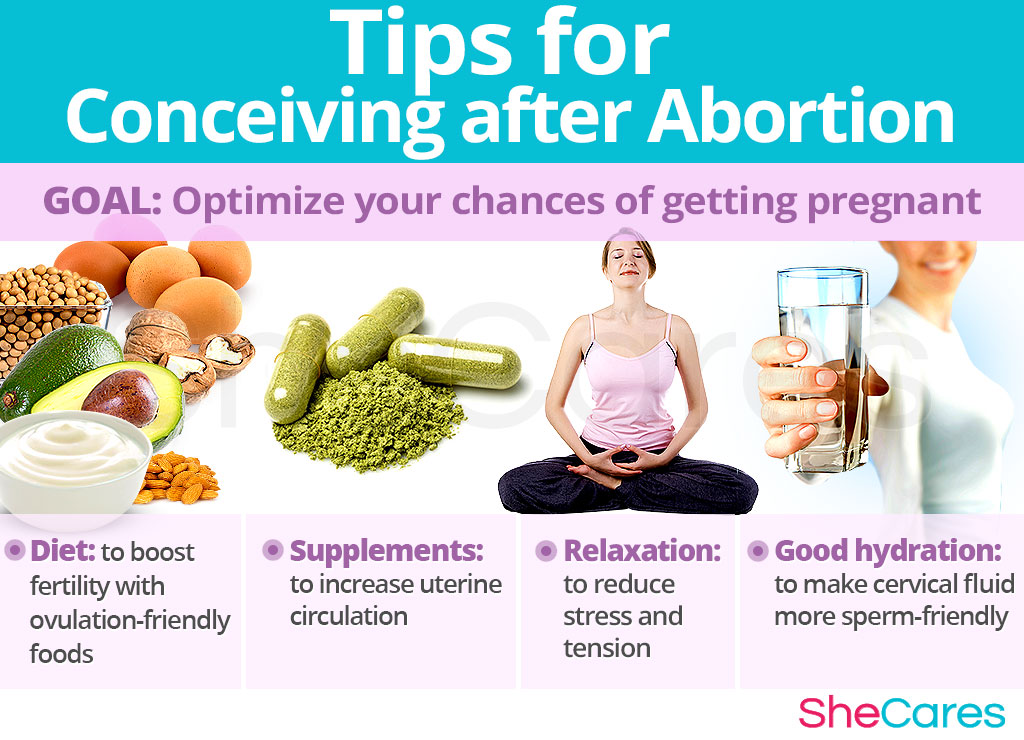
Pregnancy after Abortion
In a great majority of cases, women who had an abortion in the past go through a normal progression of pregnancy as other women. The goal is to stay optimally healthy with good habits. Consider the following:
Make sure you get enough rest as lack of sleep and tiredness might lead to the development of certain complications, such as gestational diabetes.
Focus on activities that promote calmness and peacefulness. Listening to relaxing music, taking a long walk, or engaging in a new hobby are some great ideas to reduce stress and anxiety.
Increase your calorie intake by 300 a day in the second and third trimesters, and maintain a well-balanced diet and proper hydration to help your baby grow.
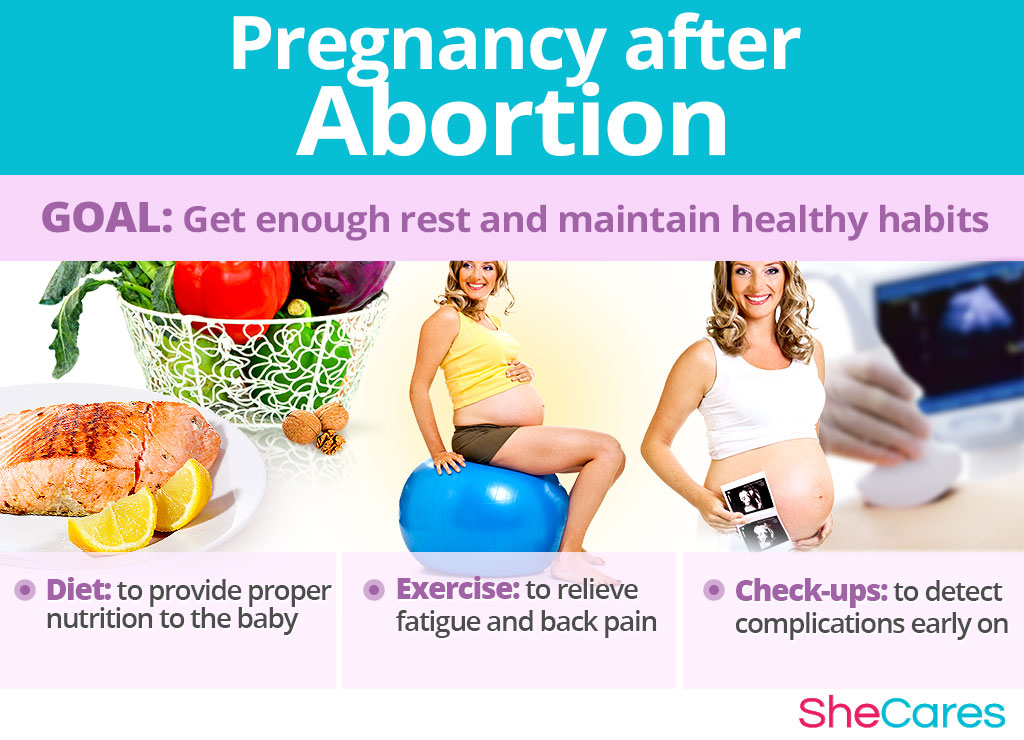
Key Takeaways
For many women, undergoing an abortion is not an easy decision. Some notice that a lot of unresolved emotions from the past tend to resurface as they transition into motherhood. Take the time to prepare your body and mind for getting pregnant by eating a nutritious diet, staying active, and taking natural supplements, like Macafem. Whatever was your reason for terminating your previous pregnancy, rest assured that you can have a fresh chance to become a mother.
Sources
- American Pregnancy Association. (2016). Possible Physical Side Effects after Abortion. Retrieved February 23, 2018 from http://americanpregnancy.org/unplanned-pregnancy/abortion-procedures/
- Baillière's Clinical Obstetrics and Gynaecology. (1990). The effect of pregnancy termination on future reproduction. Retrieved February 23, 2018 from https://www.ncbi.nlm.nih.gov/pubmed/2225607
- Louisiana Department of Health. (n.d.). Abortion and Pregnancy Risks. Retrieved February 23, 2018 from http://ldh.la.gov/index.cfm/page/915
- Mayo Clinic. (2017). Getting Pregnant. Retrieved February 23, 2018 from https://www.mayoclinic.org/healthy-lifestyle/getting-pregnant/expert-answers/abortion/faq-20058551
- Medline Plus. (2016). Abortion. Retrieved February 23, 2018 from https://medlineplus.gov/abortion.html
- National Health System. (2016). Can having an abortion affect my fertility? Retrieved February 23, 2018 from https://www.nhs.uk/chq/Pages/1645.aspx?CategoryID=60
- North Dakota Health Department. (2016). Information about Pregnancy and Abortion. Retrieved February 23, 2018 from https://www.ndhealth.gov/familyhealth/Preg_Abortion_booklet_final.pdf
